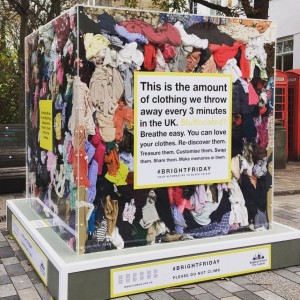Today on Black Friday 2021, we would like to highlight a blog post written in 2016 by Sustainability Officer Maria Rabanser. It seems that Black Friday has not changed much in the past five years – let’s hope that in another five years our approach to overconsumption will have shifted.
In the US, Black Friday – the day after Thanksgiving – has been regarded as one of the biggest shopping days of the year since 1932, with news reports and viral videos of fights breaking out at large stores being a regular fixture. Some retailers such as Amazon and Asda started bringing Black Friday to the UK in the 2000s, and more stores joined in 2014. This year in 2021, shoppers are expected to spend almost £9.2bn over the weekend.
This surge in sales, particularly in electronics, can have huge environmental impacts. Their production is often resource-intensive, while lifespans are short, and disposal is often problematic. According to the UN’s Global E-Waste Monitor, only 17.4% of the document global e-waste was collected and properly recycled in 2020.
Clothes can be a problem too, with large amounts being thrown away every day. And many of us seem to not enjoy Black Friday as much as retailers are trying to tell us: Polls by the charity Hubbub suggest that 2 in 3 people say they do not enjoy Black Friday, and 6 in 10 said they bought things they never used.
So what are the alternatives?
More businesses and charities are now promoting the idea of either using Black Friday as an opportunity to only buy something they were planning to buy anyway, or to stay away from shops (and online stores!) entirely, and spend the day in a different way.
This movement against impulsive purchasing behaviour has grown into Green Friday. IKEA, for example, has started a sell-back program where you can sell your preloved IKEA products back to them for a store credit or hand in your used home furnishing and electronics in return for a coupon. Ketonico will donate 30% of all purchases to the Spanish Food Bank Foundation, an organisation that responds to the food demand of socially vulnerable communities and individuals.
If you do want to make the most of Black Friday discounts, WRAP recommended SMART shopping in 2016:
Shortlist – Research products you want to buy in advance.
Make a decision – Choose the product you want to go for before you go out.
Act! – Don’t impulse buy, stick to your plan and the products you researched.
Register – For appliances, register your new purchase online as a safety precaution, and you might be entitled to an extended warranty by the manufacturer.
Trade-in – Trade your old products to save money on your new purchases. If something is broken, make sure you recycle it. RecycleNow have a handy guide to find your nearest recycling point!
With Christmas, and the high levels of waste and packaging that come with it, around the corner, opting out of excessive shopping on Black Friday is the first step towards a more sustainable festive season. Adopting a more sustainable approach to consumption will also contribute to achieving UN Sustainable Development Goal 12: Responsible consumption and production. How will you be spending the day?
Having a wardrobe clearout inspired by the Trade-in element of SMART?
Then check out Smart Works. This charity helps women to regain the confidence they need to return to employment and transform their lives by providing them with quality clothing and job interview coaching. Drop off points for Elevate’s clothes donation campaign for Smart Works are now open until Friday 17 December, with locations across our campuses.


